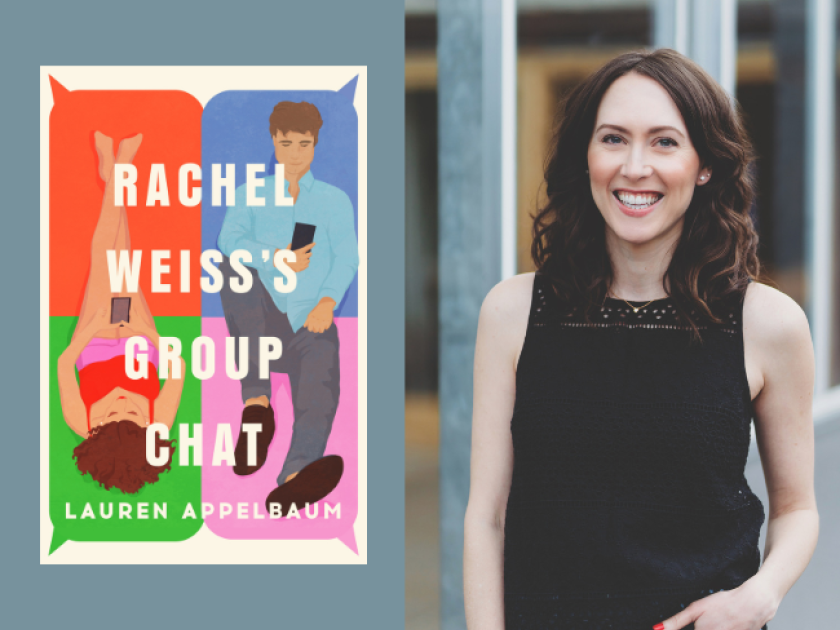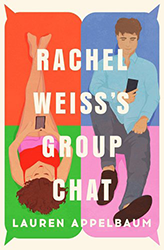
Author photo by Kiersten Marie
Mrs. Bennet has always reminded me of a Jewish mother. A harried matriarch, desperate to see her five daughters wed? My own mother isn’t far off from that, though she only has three daughters, and her definition of success is broader than simply matrimony, the main aspiration for most Regency women.
As a Jewish woman and a lifelong fan of Jane Austen’s books, I thought it just made sense to write a Jewish adaptation of Pride and Prejudice. I knew from the start that I wanted Rachel Weiss, the heroine of my debut novel, Rachel Weiss’s Group Chat, to be a modern-day version of Bridget Jones — the star of the most famous Pride and Prejudice adaptation. Bridget is zany, sarcastic, and perpetually Too Much in a world (London of the 1990s) where women are supposed to be small, quiet, and polite.
This felt relatable to me, as I’m sure it does to many other Jewish readers and moviegoers. Were the book set in a present-day Seattle, Bridget Jones would be Jewish, for sure.
I have always been conflicted about the stereotypical brash Jewish woman caricature. On the one hand, the Fran Fines of the world are familiar to me: I saw my mom, aunts, and grandmother in them. On the other hand, as a painfully shy child, I didn’t see myself in them at all, and it was another data point in the running list of things (including being Jewish only on my mother’s side, and a general lack of Yiddish vocabulary) that made me Not Jewish Enough. (Enough for what? We may never know.)
But as an adult, I fell in love with the Jewish characters I was seeing on screen, like Midge Maisel, Ilana Glazer, and Alexis and David Rose. They were sharp, funny, beautiful, and irreverent. Knowing at my advanced age that I would never become a character like that, I decided to write one.
Rachel’s story is reflective of a certain type of Jewish life that’s familiar to many of us: one where the most potent reminder of our Jewishness is going back to our parents’ house for Shabbat dinner now and then.
Enter Rachel Weiss, the Jewish, Seattle-dwelling answer to Bridget Jones and her predecessor, Elizabeth Bennet.
Elizabeth Bennet is beloved for her wit, her intelligence, and her ability to be a little removed from the general hubbub. The reserved bookworm in me always related more to her than to any of the Jewish characters I read about. (Not that I had many of those to choose from. The only Jewish books I remember reading in my childhood took place during the Holocaust.) Elizabeth Bennet is, in a word, aspirational. Mr. Darcy falls in love with her because she is, as we might say today, “not like other girls.” I took that idea and ran with it. Rachel Weiss, a bold, confident, loud-mouthed Jewish woman in buttoned-up Seattle, is definitely not like the other women our hero, Christopher Butkus, meets in his sphere. But when he hints as much, she calls him out on it. Because while Rachel does love to read as much as Elizabeth Bennet, she also loves to shop and drink rosé as much as the next girl, and she knows there’s nothing wrong with that.
Another central element of both Rachel’s and Elizabeth’s story is friendship. Elizabeth is aghast when her friend Charlotte announces her intention to marry Mr. Collins. Once she recovers from the initial shock that her friend could make such a big decision without consulting her — and from the fact that Charlotte made a decision Elizabeth would never have made for herself — Elizabeth understands that Charlotte was doing what she felt she had to do. I wove similar themes into the storylines of Rachel’s three best friends. They struggle with their love lives in different ways, and Rachel grapples with how she feels about their choices, and how their love lives gradually take precedence over their friendship. Whether Rachel is aware of it or not, her sense of certainty that she knows what’s best for her friends mirrors the way her mother treats her and her sisters.
There’s a kernel of truth in every stereotype, and there are some Jewish mothers who feel that they know what’s best for their children and are not afraid to say it. While Mrs. Bennet and Rachel’s mother, Beth Weiss, are both shrill and embarrassing, I gave Beth Weiss a slightly redeeming moment in which Rachel sees the fear, love, and vulnerability behind her mother’s scheming.
Because this is my debut novel, and because it is a Jewish retelling of Pride and Prejudice, I’ve felt impostor syndrome in more ways than I can count. The Bennets, while not outcasts, are somewhat on the fringe of society. Rachel Weiss’s family, while not discriminated against, doesn’t fully fit in as a Jewish family in a culturally Nordic Seattle. At the same time, Rachel’s Jewishness is not central to the plot, and her love interest isn’t Jewish. Will Jewish readers be disappointed at the lack of Jewishness in the story? I asked myself. Will they feel misled?
In the end, I’ve had to remind myself that Rachel’s story is reflective of a certain type of Jewish life that’s familiar to many of us: one where the most potent reminder of our Jewishness is going back to our parents’ house for Shabbat dinner now and then. It is a Jewish story, because it’s Rachel’s. And mine.
Jane Austen may never have written a Jewish character, but her stories have inspired generations of readers and writers, and retelling her beloved Pride and Prejudice through a Jewish lens turned this shy, Jewish bookworm into a published author.


